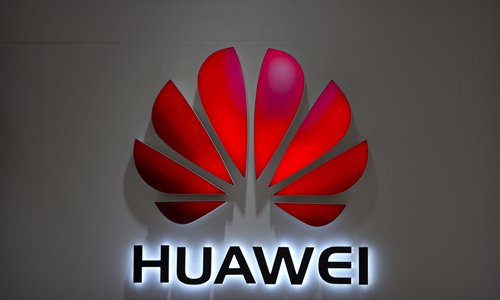HOME >> SOURCE
Huawei's 2019 revenue surges 19.1% despite US sanctions
Source:Global Times Published: 2020/3/31 17:02:30

Huawei logo File photo: IC
Chinese technology giant Huawei posted strong annual revenue growth of 19.1 percent year-on-year in 2019, brushing off the US' intensified crackdown and as it continued to move forward amid headwinds.
Revenue stood at 858.5 billion yuan ($120.9 billion), while net profit rose 5.6 percent year-on-year to 62.7 billion yuan.
The company invested 15.3 percent of its 2019 revenue - or 131.7 billion yuan - back into R&D, up from its R&D input of 101.5 billion yuan in 2018. Its total R&D spend over the past decade now exceeds 600 billion yuan.
Moreover, despite lagging overseas sales under the threat of a US ban, its consumer businesses continued to grow, with global shipments achieving growth of 16.8 percent year-on-year for 2019, securing its position as the world's second-largest handset manufacturer with a total of 240 million phone sales.
"2019 was an extraordinary year for Huawei," said Eric Xu, Huawei's rotating chairman. "Despite enormous outside pressure, our team forged ahead with a singular focus on creating value for our customers. We worked hard to earn their respect and trust, as well as that of our partners around the globe. Business remains solid."
The strong annual report also comes as the US has been mulling new restrictions on the Chinese technology giant. Washington is reportedly moving ahead with new restrictions to cut off Chinese telecom equipment provider Huawei's supply chain by requiring foreign companies that use US equipment to obtain a license before shipping their chipsets to the Chinese company.
A source in a Reuters report was quoted as saying the rule change is aimed at curbing sales of chips to Huawei by Taiwan Semiconductor Manufacturing Co, which is also the major producer of chips for Huawei's chipset set unit HiSilicon.
Xu noted during the release on Tuesday that the external environment "will only get more complicated going forward."
"The challenge before Huawei remains huge, but Huawei will survive the US attack," Xiang Ligang, a veteran telecom analyst who is also a close follower of Huawei, told the Global Times on Tuesday.
"Huawei is becoming a multinational company with many suppliers scattered around the world. So, to ban Huawei means to disrupt a global supply chain, and no single technology company would escape the pain, no matter whether it's Qualcomm, Intel or TSMC," Xiang said.
Global Times
RELATED ARTICLES:
Posted in: COMPANIES